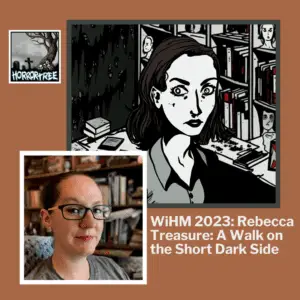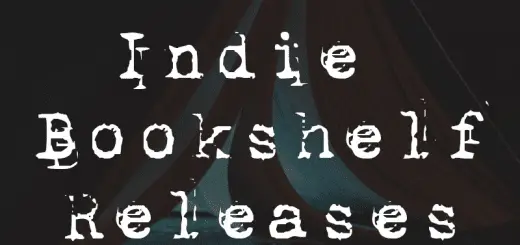WiHM 2023: Rebecca Treasure: A Walk on the Short Dark Side

Rebecca Treasure: A Walk on the Short Dark Side
By Angelique Fawns
I met Rebecca Treasure when I took her course this February, Keep it Short: Tips and Tricks for Writing Flash Fiction through the Reach Your Apex initiative from Apex Magazine. It was nothing “short” of amazing. Apex Magazine features dark speculative fiction, so I asked Rebecca if she could talk to us about her work for WIHM. She has been published in Zooscape, Seize the Press, Galaxy’s Edge, Air & Nothingness Press, and The Dread Machine, to name a few.
AF: When did you first decide that you wanted to become a writer?
RT: That’s a funny question for me. As a young child, I read voraciously and wrote on and about everything. I wrote an epistolary horror novel (though I didn’t know that’s what it was called) about a convicted murderer when I was in seventh grade. I wrote endless pages of poetry throughout my teen years. And then, when I returned to college with some seriousness, I stopped writing creatively. All through my undergrad and graduate years, I basically developed amnesia that I’d ever had any interest in creative writing – while continuing to read voraciously whenever I could. When I finally “decided” to become a writer after my second child turned one, I felt like I was rediscovering who I was meant to be all along.
AF: You are a prolific short story writer, tell me yours secret to grabbing your readers!
RT: I think there are as many ways to grab readers as there are words, and am a big fan of the advice, “if it works, it works!” That being said, I’ll often try to have the opening sentence do something evocative – whether to raise a question or spark an intriguing or startling image or tap into some deep emotion that might resonate with readers.
AF: Why dark, speculative fiction? Is there a reason you prefer the short story form?
RT: It’s funny, because when I started writing, I wanted to be a novelist and didn’t even consider short fiction. When I did start writing short, it was because I thought it would be easier than novels, and I could practice a few things while I was at it. Oh, dear. Turns out short fiction isn’t any easier, and I absolutely fell in love with the power and potency of short fiction. As for why dark – it’s what comes out of my fingertips when I write! I read broadly, but the stories I tend to tell trend toward the darker side of things.
AF: How did you become involved in Apex?
RT: I saw an opportunity to become a slush reader for the magazine and jumped at it as a fan. After reading for the magazine for a while, there was an opportunity to move into a staff position, and I’ve been there ever since! I absolutely love working for Apex.
AF: You are the flash fiction editor at Apex Magazine, what hints do you have for writers? What would you like to see more of?
RT: Because the flash fiction is run as a themed contest, there’s nothing I want to see more of except more stories – but I do encourage writers to try to come up with a unique take on those themes. Every month we get a lot of stories that are very similar – black hole stories when the theme was VOID, for instance – and those rarely reach the final stack. Surprise us! As for hints, there’s no secret beyond telling a spectacular story, but I do see a lot of pieces that are either doing too much or too little with the word count. Think about your pacing and whether there is a complete story (whether on the page or not).
AF: Who are your personal writing influences?
RT: Oh gosh, so many. I grew up reading the ‘classic’ science fiction authors from my parents’ shelves – Heinlein, Asimov, Niven and Pournelle. As a teenager I fell in love with fantasy and read Mercedes Lackey especially. I adored Sylvia Plath and Ernest Hemingway, carrying around a collection from each in my purse throughout high school. I also read so much Francesca Lia Block I stole permanently, borrowed all of her books from our local library and hid them under my mattress. In my twenties, I fell in love with the Riftwar Cycle by Raymond E. Feist. And now I read so much short fiction – my favorite authors are Alix E. Harrow, P H Lee, Meg Elison, E. Lily Yu, and about fifty more.
AF: Do you have a day job? How do you achieve work/life balance?
RT: Apex and writing are my day jobs! I’m lucky to be able to work from home doing what I love. I was a violin and viola teacher for 20 years but recently stepped back from that because of the demands of writing and editing. I have two elementary-aged children and spend a lot of time with them in addition to a thriving Stardew Valley farm and exploring Hyrule. I am a big believer in work hard, play hard, take naps. Balance isn’t something you achieve, it’s something you have to continually work at.
AF: What is in the future for Rebecca Treasure?
RT: Right now, I’m in the midst of a big international move, so that’s about all I can handle. In my writing life, I’m querying a Napoleonic historical fantasy, researching an epistolary historical horror, and writing a fun urban fantasy. I try to write a short story every month, minimum, as well. Apex is running a Kickstarter right now (https://www.kickstarter.com/projects/apexpublications/robotic-ambitions) so that’s eating up all my time at work as we anxiously refresh the campaign page.
Thanks so much for having me!
- About the Author
- Latest Posts
Angelique Fawns writes horror, fantasy, kids short stories, and freelance journalism. Her day job is producing promos and after hours she takes care of her farm full of goats, horses, chickens, and her family. She has no idea how she finds time to write. She currently has stories in Ellery Queen, DreamForge Anvil, and Third Flatiron’s Gotta Wear Eclipse Glasses. You can follow her work and get writing tips and submission hints at http://fawns.ca/.












